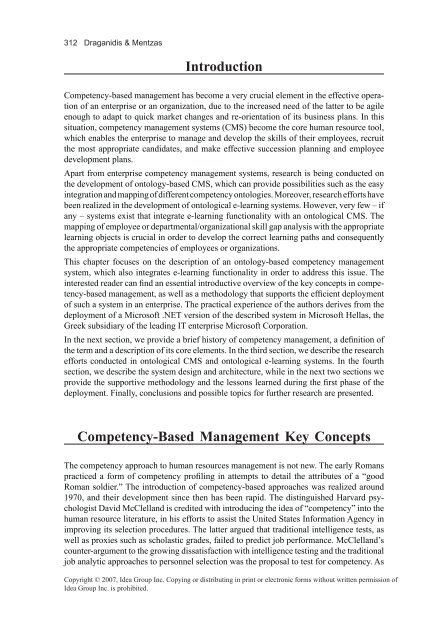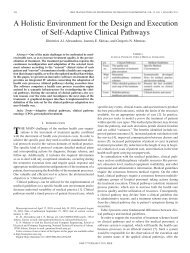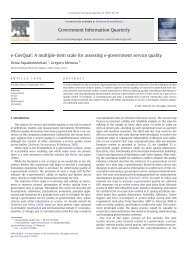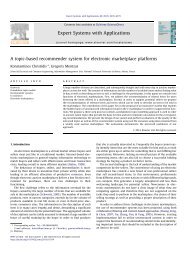Ontology-Based Competency Management for Corporate E-Learning
Ontology-Based Competency Management for Corporate E-Learning
Ontology-Based Competency Management for Corporate E-Learning
You also want an ePaper? Increase the reach of your titles
YUMPU automatically turns print PDFs into web optimized ePapers that Google loves.
312 Draganidis & Mentzas<br />
Introduction<br />
<strong>Competency</strong>-based management has become a very crucial element in the effective operation<br />
of an enterprise or an organization, due to the increased need of the latter to be agile<br />
enough to adapt to quick market changes and re-orientation of its business plans. In this<br />
situation, competency management systems (CMS) become the core human resource tool,<br />
which enables the enterprise to manage and develop the skills of their employees, recruit<br />
the most appropriate candidates, and make effective succession planning and employee<br />
development plans.<br />
Apart from enterprise competency management systems, research is being conducted on<br />
the development of ontology-based CMS, which can provide possibilities such as the easy<br />
integration and mapping of different competency ontologies. Moreover, research ef<strong>for</strong>ts have<br />
been realized in the development of ontological e-learning systems. However, very few – if<br />
any – systems exist that integrate e-learning functionality with an ontological CMS. The<br />
mapping of employee or departmental/organizational skill gap analysis with the appropriate<br />
learning objects is crucial in order to develop the correct learning paths and consequently<br />
the appropriate competencies of employees or organizations.<br />
This chapter focuses on the description of an ontology-based competency management<br />
system, which also integrates e-learning functionality in order to address this issue. The<br />
interested reader can find an essential introductive overview of the key concepts in competency-based<br />
management, as well as a methodology that supports the efficient deployment<br />
of such a system in an enterprise. The practical experience of the authors derives from the<br />
deployment of a Microsoft .NET version of the described system in Microsoft Hellas, the<br />
Greek subsidiary of the leading IT enterprise Microsoft Corporation.<br />
In the next section, we provide a brief history of competency management, a definition of<br />
the term and a description of its core elements. In the third section, we describe the research<br />
ef<strong>for</strong>ts conducted in ontological CMS and ontological e-learning systems. In the fourth<br />
section, we describe the system design and architecture, while in the next two sections we<br />
provide the supportive methodology and the lessons learned during the first phase of the<br />
deployment. Finally, conclusions and possible topics <strong>for</strong> further research are presented.<br />
<strong>Competency</strong>-<strong>Based</strong> <strong>Management</strong> Key Concepts<br />
The competency approach to human resources management is not new. The early Romans<br />
practiced a <strong>for</strong>m of competency profiling in attempts to detail the attributes of a “good<br />
Roman soldier.” The introduction of competency-based approaches was realized around<br />
1970, and their development since then has been rapid. The distinguished Harvard psychologist<br />
David McClelland is credited with introducing the idea of “competency” into the<br />
human resource literature, in his ef<strong>for</strong>ts to assist the United States In<strong>for</strong>mation Agency in<br />
improving its selection procedures. The latter argued that traditional intelligence tests, as<br />
well as proxies such as scholastic grades, failed to predict job per<strong>for</strong>mance. McClelland’s<br />
counter-argument to the growing dissatisfaction with intelligence testing and the traditional<br />
job analytic approaches to personnel selection was the proposal to test <strong>for</strong> competency. As<br />
Copyright © 2007, Idea Group Inc. Copying or distributing in print or electronic <strong>for</strong>ms without written permission of<br />
Idea Group Inc. is prohibited.





